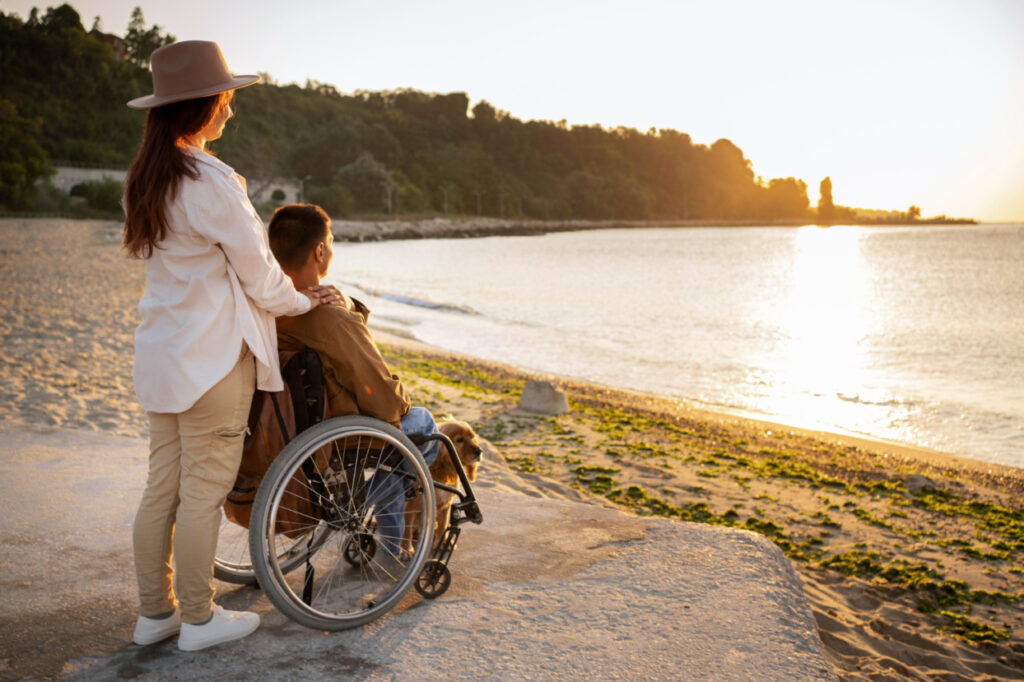Despite how much you love your family, being a carer is hard and takes a lot of patience and time. When your parents or disabled family member need support from you at home, you are considered an informal carer. But when the needs increase and begin to take up significant amounts of your time, you can experience new hurdles and stress. As the age of the person in need increases, the more attention needs to be given to them and this can be an additional pressure to the family. There are professional services that can be provided as a NDIS registered user. There are different levels of support that can be provided depending on the need of the person.
If you plan on taking care of you need to eligible to obtain a carer allowance and the requirements are as follows-
A fortnightly supplement if you give additional daily care to someone who has a disability, serious illness, or is frail aged.
To get this you must:
- meet an income test
- give additional daily care to someone with a disability, severe illness or who is frail aged
- care for someone whose care needs score is high enough on the assessment tools used for an adult or a child
- care for someone who’ll have these needs for at least 12 months or the rest of their life.
Who can get it
The carer and the person you are providing care for must both be eligible.
If you get Carer Payment for a child younger than 16, you don’t need to claim Carer Allowance.
You must complete a claim for Carer Allowance if you’re providing care for either a:
person 16 or older
child younger than 16 and don’t get Carer Payment for them.
How much you can get
There’s no assets test for Carer Allowance but there is an income test. This payment doesn’t add to your taxable income. Payment rates are usually done on 1st January each year to be able keep up with cost of living.
If you’re providing care to someone 16 or older
Carer Allowance will be $131.90 each fortnight. There will be no Health Care Card for the person you will. be providing care for.
If you’re providing care for a child under 16
Carer Allowance is either:
for a child with higher needs: $131.90 each fortnight and a Health Care Card for the child
for a child with lower needs: a Health Care Card for the child.
Shared care
If you share care of the child and the other parent is not your partner:
you get part of the payment the other carer gets the rest, based on how much care you each provide.
Now that we have covered what requirements and allowance amount you can receive to take care of an individual in your family. One needs to understand that as time passes by, this becomes more difficult and a chore as a lot of times. A lot of times trying to take care of older people/disabled family members can become a cause of stress and you are unable to enjoy and cherish your time with them. Have you ever felt that the time is running out and maybe you want to relax and spend time with your loved one instead of worrying about their well being? Maybe it’s time to reconsider and seek for other options.
What Support am I able to Get?
As well as various home care support options, a crucial support service to access is respite, for you and your parents.
Help is at hand after you are feeling overwhelmed. Aged care gives you a possibility from your carer duties without you having to worry about your parents being neglected.
A Few forms of Respite Care Include:
In-home respite – A carer involves your residential home
Residential respite – Care will be provided to your parents when they are within the aged care facility while you recharge yourself.
Centre-based respite – Usually held at a community centre or club and sometimes providing group activities during a social setting.
Research shows carers believe the three main purposes of respite are to provide them a prospect from their caring responsibilities (84%), to grant them a chance to appear after their own health and wellbeing (76%), and to assist them sustain their caring role (68%). To place it more simply, respite gives you time to try and do the items you normally cannot, whether it’s running errands, socialising with friends, or attending counselling or a support group. Doing these items can leave you rejuvenated, so you’ll be more attentive and patient while caring for your parents.
Does your Parent need In-Home Care from A Professional?
It is completely alright to hunt professional aged look after yourself or loved ones. Unless you’re personally trained in aged care support or nursing, there always comes limits to what you’ll do.
This is after we can step in and facilitate your professional, top quality In home care services. We are here to answer your questions, personalise a support arrangement to best suit everyone. If you’d prefer to speak to at least one of our expert life-planners, be at liberty to contact us and that we will facilitate you through all the steps.










